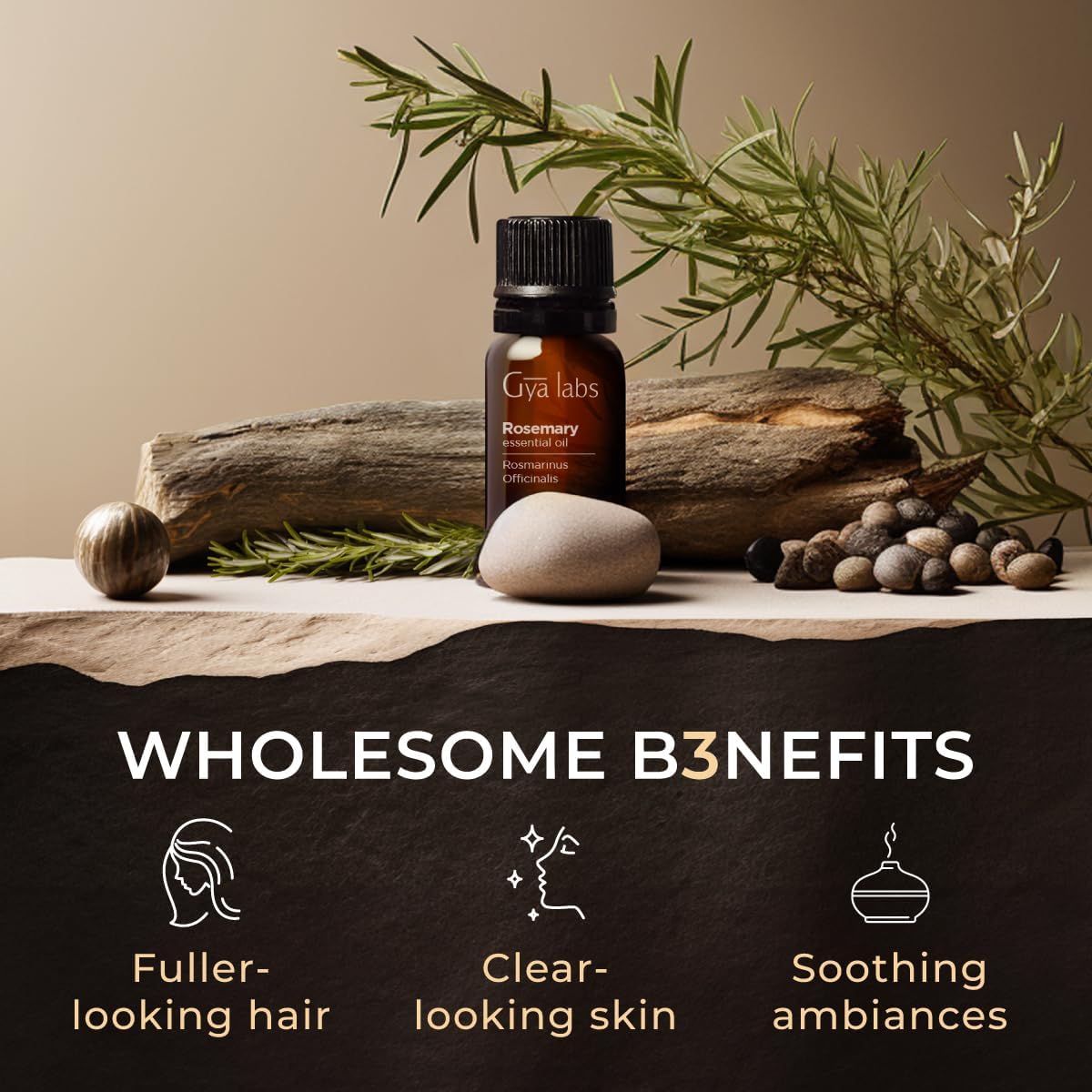Key Takeaways:
- Rosemary oil is often touted for its ability to promote hair growth, not cause hair loss.
- It's essential to dilute rosemary essential oils with a carrier oil to avoid scalp irritation.
- Consulting with a healthcare professional is recommended before incorporating rosemary oil into your hair care routine, especially for those with sensitive skin or scalp conditions.
Rosemary oil has been a staple in the natural health community for its potential benefits in promoting hair growth and preventing hair loss. However, there is a growing concern among users about whether rosemary oil can cause hair loss. This article aims to provide a comprehensive analysis of the relationship between rosemary oil and hair health.
Understanding Rosemary Oil and Hair Health

Rosemary oil for hair is derived from the Rosmarinus officinalis plant, native to the Mediterranean region. It is known for its powerful antioxidant, antimicrobial, and anti-inflammatory properties, which are believed to contribute to its ability to stimulate hair growth. A randomized comparative trial has even suggested that rosemary oil can be as effective as minoxidil, a common hair regrowth treatment, in treating androgenetic alopecia.
The Science Behind Rosemary Oil Promoting Hair Growth
The use of rosemary oil to encourage hair growth is backed by scientific evidence. It is thought to improve circulation to the scalp, leading to a significant increase in blood flow, which in turn nourishes the hair follicles and promotes hair regrowth. Additionally, its antioxidant properties help in preventing breakage and maintaining the health of the hair.
Potential Causes of Hair Loss with Rosemary Oil
While rosemary oil is generally considered safe, there are a few ways it could potentially contribute to hair falling out. Highly concentrated rosemary essential oils, if not properly diluted with a carrier oil such as coconut or argan oil, can lead to scalp irritation. This irritation might result in inflammation that could potentially damage hair follicles and cause hair loss.
The Importance of Diluting Rosemary Oil
To avoid skin irritation and potential hair loss, it is crucial to dilute rosemary oil with a carrier oil. Common carrier oils include coconut oil, olive oil, and jojoba oil. A few drops of rosemary oil mixed with these can reduce the risk of adverse reactions and make the oil safe for application on the scalp.
Rosemary Essential Oil: A Comparison with Other Hair Oils
When considering rosemary essential oil in the context of hair health, it's essential to compare its efficacy with other popular hair oils. Rosemary oil is renowned for its ability to potentially assist in regrowing hair, thanks to its rich composition that may improve blood circulation to the scalp. This is in contrast to oils like coconut or argan oil, which are primarily used for their moisturizing and hair shaft smoothing properties. While these oils can prevent breakage and improve hair texture, they may not directly influence hair growth as rosemary oil purportedly does.
In addition to its potential hair regrowth benefits, rosemary oil is also celebrated for its antimicrobial and anti-inflammatory properties. These characteristics make it a formidable opponent against scalp irritations and infections that can lead to hair loss. Unlike some heavier oils that can exacerbate scalp issues by clogging pores, rosemary oil is lighter and can be a more suitable option for those with sensitive scalps. When adding essential oils to your hair care routine, considering the unique benefits of each is crucial for achieving the desired results.
Integrating Rosemary Oil into Your Hair Care Routine
Integrating rosemary essential oil into your hair care routine can be a game-changer for those struggling with shrinking hair follicles and thinning hair. One of the most effective ways to harness the power of rosemary is by creating a rosemary mint scalp treatment. This can be done by mixing a few drops of rosemary oil with a carrier oil like jojoba or almond oil and then massaging the blend into the scalp. This not only stimulates the scalp but also provides a refreshing sensation, thanks to the mint.
Another popular home remedy is rosemary water, which can be used as a final rinse after shampooing. To prepare, simply steep rosemary leaves in boiling water, allow them to cool, and then strain the mixture. This rinse aims to enhance hair count and add a natural sheen to your locks. For those seeking the best rosemary oils, it's important to look for products that are 100% pure, without any added synthetic fragrances or chemicals. By choosing high-quality rosemary essential oil, you can maximize its potential benefits for your hair.
Rosemary Oil and Sensitive Skin

Individuals with sensitive skin or existing skin conditions should be particularly cautious when using rosemary oil. Allergic reactions can occur, leading to symptoms like redness, itching, or swelling. It is always best to perform a patch test before fully integrating rosemary oil into your hair care routine.
Best Practices for Using Rosemary Oil
When incorporating rosemary oil for hair growth into your regimen, it's important to follow best practices. This includes using the oil in moderation, ensuring it is adequately diluted, and applying it correctly to the scalp. Massaging the oil into the scalp can also help to stimulate hair growth by improving blood circulation.
Rosemary Oil for Different Hair Types
Rosemary oil may be beneficial for various hair types, including dry hair, color-treated hair, and even those suffering from hair loss conditions like androgenic alopecia. However, the oil should be used with caution, as each hair type can react differently to essential oils.
Homemade Shampoo with Rosemary Oil
Creating a homemade shampoo with rosemary oil is a natural remedy that can be tailored to your specific hair needs. By adding essential oils like rosemary to a base shampoo, you can create a product that helps to prevent hair loss while also catering to dry or color-treated hair.
Consulting a Healthcare Professional
Before adding rosemary oil to your hair care routine, it is advisable to consult with a healthcare professional or a board-certified dermatologist. They can provide a safety assessment and help determine if rosemary oil is an appropriate treatment for your hair concerns.


Can rosemary oil directly cause hair loss?
Rosemary oil is not known to cause hair loss when used properly. It is typically used to promote hair growth. However, if used undiluted or in excess, it can cause scalp irritation, which may indirectly lead to hair loss.
How should I use rosemary oil to prevent hair loss?
To prevent hair loss, rosemary oil should be diluted with a carrier oil and massaged into the scalp to stimulate blood circulation. It's recommended to start with a few drops of rosemary oil mixed with a carrier oil like coconut or jojoba oil.
Is rosemary oil suitable for all hair types?
Rosemary oil can be suitable for various hair types, but individuals with sensitive skin or scalp conditions should use it with caution. It's always best to consult with a healthcare professional before using rosemary oil, especially for those with color-treated hair or dry hair.

Rosemary oil is widely recognized for its ability to promote hair growth and prevent hair loss. However, improper use, such as failing to dilute the oil or using it on sensitive skin without caution, can lead to scalp irritation and potentially hair loss. By following best practices and consulting with a healthcare professional, rosemary oil can be a safe and effective addition to your hair care routine.










